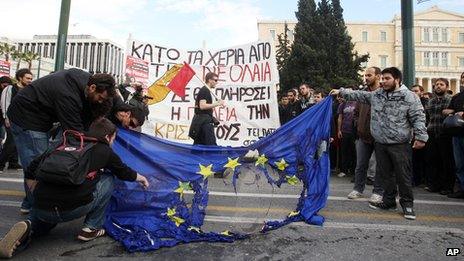The pain of southern Europe's unemployed
- Published
- comments

Some economists say Germany's austerity measures have trapped southern countries in a cycle of decline
When Europe's unemployment figures were published today, they once again underlined the north-south divide. Increasingly there are two Europes.
As Andrea Broughton from the Institute for Employment Studies points out: "At the lowest end are Austria, with an unemployment rate of just 4.8%, Germany (5.4%) and Luxembourg (5.5%).
"This contrasts with Greece, where the rate is 26.2% (December 2012 figure), Spain, with a rate of 26.3%' and Portugal, with a rate of 17.5%."
Perhaps the most disturbing figure is for youth unemployment. The average rate for the under 25s in the EU is 23.5%. Nearly a quarter of Europe's youth are not working. In Spain the figure is 55.7%.
For the moment the strategy for keeping the eurozone together is sharpening Europe's divide.
The Germans believe that a combination of austerity and structural reforms will eventually spark growth in southern Europe and narrow the gap in competitiveness.
There are a significant number of officials and economists, however, who doubt the policy is working. Indeed they believe that several countries are now trapped in a cycle of decline.
Only this week the French President Francois Hollande said that "sticking with austerity would condemn Europe not just to recession but an explosion".
Lost generation
So far Europe's young people have been remarkably tolerant of unemployment levels reminiscent of the Great Depression.
There has been some burning of EU flags and anger with the Germans but Europe's so-called lost generation has not yet challenged the role of Europe and its institutions.
Brussels and Europe's leaders have been able to blame the crisis on the financial crisis of 2008 and to insist it was "made in America". But the truth is somewhat different.
More than half of Spain's under 25s are jobless
The structure of the eurozone, with one interest rate for all, enabled countries like Spain to embark on a construction boom. Ireland had a similar story. Greece initially benefitted from unrestricted flows of outside capital and wages soared.
What the financial crisis in America did was to bring the party to an end. A reckoning followed. The price is still being paid with wages and costs being slashed in an attempt for these mainly southern countries to regain competitiveness within a monetary union.
The question remains: in the end were the economic differences between the countries which adopted the euro too great and are millions of young Europeans paying for that mis-judgment?
Whilst the official line is that the euro has been saved, privately there is far more anxiety.
Increasingly the threats to the eurozone are seen as not so much the bond spreads, but the combination of deepening recession and rising unemployment in parts of Europe.
As Nicholas Spiro of Spiro Sovereign Stategy said, "the surge in joblessness coupled with this morning's grim PMI surveys [manufacturing surveys] are a glaring example of the extent to which market sentiment towards the eurozone has become detached from economic fundamentals. The disconnect is most pronounced in Spain and Italy but is also manifest in France".
Europe's leaders are in the fourth year of fighting this crisis and the reality is that the gap between some of those countries which share the common currency is only widening.